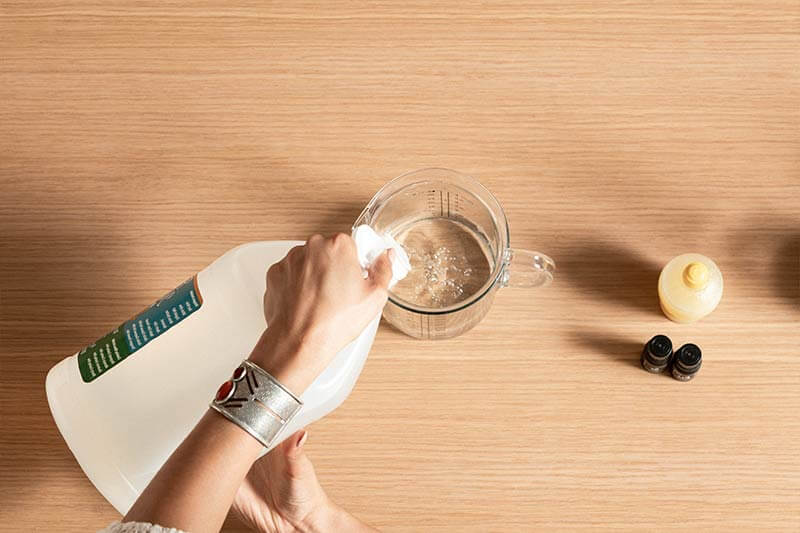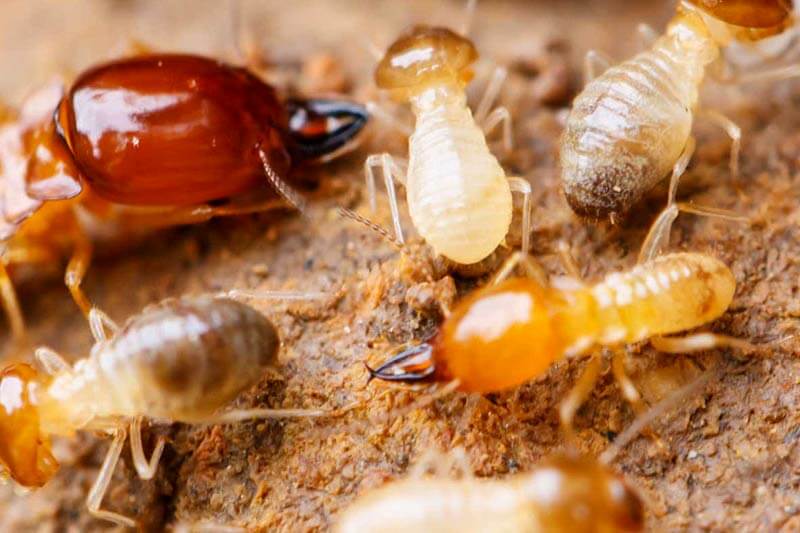Vinegar is the ultimate all-purpose cleaning solution around the home. The question is, can it be used to kill termites? And can you use it as an alternative to toxic pesticides that are usually used to get rid of termites?
Yes, vinegar can kill termites. However, as a method of getting rid of a termite infestation, it is not effective. This is because it only works well when it is concentrated. And even in concentrations of up to 20%, it is still not effective enough to completely get rid of a termite colony.
Here is what you need to know about vinegar and termite control.

Vinegar can be used as a termite control solution.
It can effectively:
- repel termites
- kill termites
Vinegar repels termites
Vinegar can effectively repel termites; however, it doesn’t have a strong repellent effect simply because it normally doesn’t have high concentrations of acetic acid.
Even when one uses vinegar with a high concentration, the effect isn’t as pronounced as when using commercial solutions.
There is also the fact that the repelling effect of vinegar fades away. In as few as two days, the applied vinegar will have already lost its power.
Vinegar kills termites
Studies show that vinegar kills termites. Therefore, you can effectively use it to kill termites around your home.
But how exactly does the vinegar work?
How does vinegar kill termites?
Vinegar is an effective termite killer because it contains acetic acid. As an acid, acetic acid is corrosive. But it is especially corrosive against the exoskeletons of termites.
When the acid comes in contact with termites, it destroys the termites’ exoskeletons. This does two things:
- It injures the termite significantly
- It also robs the termites of the protection that their exoskeletons typically offer
A combination of these two factors usually leads to the death of termites.
Based on the above information, it means that:
- In order to for the vinegar to be effective, it needs to come in direct contact with the termites
- The effectiveness of a vinegar solution depends on how much acetic acid the vinegar contains. As a result, solutions with higher acetic acid concentrations tend to be more effective than the solutions that have lower concentrations.
How do you kill termites with vinegar?
To kill termites with vinegar, follow the following steps.
- Squeeze two lemons into a container
- Add 5 ounces of vinegar into the container
- Stir to ensure a perfect mix
- Add the solution to a spray bottle and then spray it on the affected areas.
Vinegar contains acetic acid which is known to kill termites. The lemon contains d-limonene which will mess with the digestive systems of the termites. Combined, they will be more effective.
If you don’t have lemons, you can also use olive oil. To create the termite-killing solution:
- Take a cup of vinegar and pour it into a container
- Add four cups of olive oil
- Mix the solution
- Fill a spray bottle with the resulting mixture
- Spray it on the affected area
How effective is vinegar?
How effective vinegar is as a way of getting rid of termites depends wholly on the concentration of acetic acid. A solution that has a higher concentration tends to be way more effective than one that has a lower concentration.
That is the conclusion that researchers came to after analyzing the results of a study that they conducted and published in the Chilean Journal of Agriculture and Animal Sciences.
In the study, it was observed that:
- 1% concentration of acetic acid killed termites at a rate of 1.23%
- A 5% concentration killed the same termites at a 13.58% rate
- Using concentrations of 10% almost quadrupled the mortality rate (it killed 51.85% of the termites it was exposed to)
- A concentration of 20% killed termites at a rate of over 82%
What the study showed was that vinegar can actually kill termites. However, in order to be effective at killing termites, it has to be concentrated.
It is important to keep in mind that while vinegar can kill individual termites, it is not effective enough to get rid of a termite infestation. Therefore, if you are dealing with a full-blown infestation, it is always advisable that you seek a pest control professional’s help.

Why isn't vinegar good for getting rid of a termite infestation?
Vinegar isn’t an ideal termite control solution because it is not effective. It can kill a couple of termites when you spray the vinegar all over them. It can also repel termites.
But as a termite control solution, it is not very good.
Here are the reasons why you are discouraged from trying to get rid of a termite infestation with vinegar.
- Even at concentrations of over 20%, vinegar can only achieve a mortality rate of about 80%. While this is better than most natural solutions, it is not good enough to completely get rid of advanced termite infestations.
- It takes days for it to have any significant impact on termite populations. Generally, it will have to take up to 15 days to see a mortality rate of over 80%. And this is when using vinegar that has a high concentration.
- Unlike most commercial pest control solutions, vinegar doesn’t have a lasting effect. It fades really fast and this means that it has to be reapplied regularly in order to guarantee results. This can be quite tedious.
Which other natural solutions or chemicals can kill termites?
Vinegar isn’t the only natural pest control solution. There are other equally effective and safe termite killers that you can use at your home to kill termites around your home.
Here are the most effective ones.
Beneficial nematodes
Beneficial nematodes are good at killing termites. They kill them by infecting termites with deadly bacteria. They also invade their bodies and slowly feed them.
To use them against termites in your home, mix the nematodes with water and then pour the resulting mix into a bottle.
Apply the solution to the affected area and then give the nematodes time to work.
You may thereafter have to respray the area in order to completely get rid of the termites.
Diatomaceous earth
Diatomaceous earth contains particles that have really sharp edges. When they come in contact with termites, they cut their exoskeletons.
The injury that results from this is often extensive enough to kill termites. But what kills most of the termites is the fact that they lose the protection that healthy exoskeletons typically provide.
Salt
Subterranean termites are susceptible to dehydration. That is why they always build mud tubes as a way to keep them from getting dehydrated to death.
While salt isn’t harmful to human beings, it can kill subterranean termites simply because it takes advantage of their weakness; dehydration.
To kill termites with salt:
- Start by dissolving salt in hot water. Keep in mind that the more concentrated the salt solution, the better.
- Take the resulting solution and draw it into a syringe.
- Use the syringe to squirt the solution into termite hole openings. You can also just sprinkle it on wooden structures and any other surfaces that they are actively destroying.
- Repeat the process until you get rid of the termites.
Neem oil
Neem oil is incredibly effective at termite control because it messes with a termite’s hormonal system.
Once a termite has been exposed to the oil, it practically becomes unable to mate and eat. This is usually enough to kill termites. And in cases where it doesn’t, it can work as a powerful termite repellant.
To effectively get rid of termites using neem oil:
- Take raw neem oil and pour it into a container
- Add liquid soap to the container
- Add a liter of water for every 2 ml of water and mix
- Fill a spray bottle with the resulting solution
- Spray the affected areas
Cayenne pepper
Cayenne pepper is a natural ingredient that also doubles as a good pest control agent. Termites are among the pests that it is effective against.
This is because it contains capsaicin. This compound is damaging to termites. And so when termites come in contact with the pepper, it destroys their immune systems and thereby kills them.
To get rid of termites using cayenne pepper, just sprinkle the pepper in the areas where you have detected termite activity. Do so a few times more until the area is termite-free.
Use this free service to find a termite removal expert near you
If you need professional pest control services, GoTreeQuotes.com offers a free service that quickly matches you with the top-voted local pest control experts in your area.
You can get 3 estimates fast by real certified experts in your area in just 2 minutes. Here is how it works.
- You scroll to the top of the page and enter your Zip code.
- Answer questions about your termite problem
- Your details will be forwarded to three local experts.
- You will then receive a price estimate for the job and some friendly advice.
IMPORTANT: There is no obligation to hire. This is a free tool and service to be used at your pleasure.

FAQ's
Yes, apple cider vinegar can kill termites. This is because it contains acetic acid.
The acid is effective at destroying termite exoskeletons. And given the critical role this protective cover plays in the survival of termites, the termites usually die once they are sprayed with vinegar.
Yes, a mixture of lemon and vinegar will kill termites.
The two solutions are acidic and when combined, they form a solution that is effective at damaging termite exoskeletons. Therefore, if you have a few termites in your home, you can kill them by spraying them with a mixture of the two.
However, you should keep in mind that a combination of lemon juice and vinegar isn’t strong enough to get rid of a full termite infestation.
Yes, salt kills termites.
When a salt solution is applied to an area with termites, the salt dehydrates the termites. And this is usually enough to kill the termites. However, while it can kill some termites, salt isn’t good enough to eliminate termite infestations.



